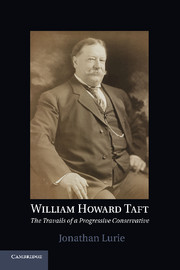6 - Jockeying on the Court, 1910–1911
Published online by Cambridge University Press: 05 December 2011
Summary
Issues with Insurgents
Even as the Ballinger–Pinchot controversy received nationwide attention, Taft encountered – if not created – further problems early in 1910 that only exacerbated the subtle but real tension between him and TR, even though the latter was not scheduled to return to the United States until June. It will be recalled that prior to his inauguration, Taft had been extremely critical of Joseph Cannon. But he also had refused to support the House insurgents as they sought to end Cannon’s domination. All this had changed when Taft tried to get a reduced tariff through Congress. Now he backed away from earlier presidential aspirations to bring about Cannon’s ouster as House Speaker. He maintained that supporting Cannon would be a small price to pay for the Speaker’s supposedly promised endorsement of Taft’s legislative program. Taft’s original position of disinterest concerning the insurgents became a matter of basic hostility. Indeed, by January 1910, it became clear that he would offer neither encouragement nor aid to the House insurgents in any way, even going so far as to deny them access to traditional patronage sources. A spokesman for the insurgents, Republican congressman – George Norris soon to become Senator from Nebraska – confronted Taft on this issue.
He reminded Taft that in reality, the insurgents were not in opposed to Taft’s legislative agenda. Far from it. Rather, we “stand for but one proposition – a change in the rules of the House that will take away from the Speaker some of his power which we believe to be unreasonable, detrimental to good government, and at times tyrannical.” Taft might try to withhold patronage from the insurgents, but it would do little good. “We have gone into this movement on principle because we believe it is right, and will not be enticed away from it by the promise of political patronage or be driven therefrom [sic] by the threat of its withdrawal.” Thus Norris tried to persuade Taft to separate opposition to Cannon from the support for Taft’s basic policies, but with no success. Missing Norris’s point, Taft denied that he was withholding patronage from the insurgents.
- Type
- Chapter
- Information
- William Howard TaftThe Travails of a Progressive Conservative, pp. 118 - 137Publisher: Cambridge University PressPrint publication year: 2011



